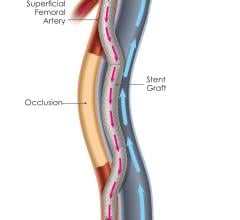HeartFlow Inc. announced that UnitedHealthcare now covers the HeartFlow FFRct Analysis, extending access to their 45 million beneficiaries. With this new coverage, more than 235 million people in the United States now have access to the HeartFlow Analysis.
The PQ Bypass Detour System showed promising 12-month durability for patients with extremely long blockages in the superficial femoral artery (SFA) in new results from the DETOUR I Trial. The data were presented as a late-breaking clinical trial session at the Society for Vascular Surgery (SVS) Vascular Annual Meeting, June 20-23 in Boston, Mass. The trial enrolled lesions longer and more complex than those typically studied in SFA clinical trials, with an average lesion length of 37cm, 100 percent TASC II C/D, 96 percent chronic total occlusions (CTO) and 81 percent with moderate-to-severe calcification.
University of Washington (UW) Medicine cardiologists have developed a tool to predict which heart-failure patients stand to gain most, and least, from an implanted defibrillator.
Providing exceptional cardiovascular care for patients to achieve the best possible outcomes is the number one goal for ...

July 2, 2018 — Here is the list of the most popular content on the Diagnostic and Interventional Cardiology (DAIC) ...
Lissa Sugeng, M.D., associate professor of medicine, director of echocardiography and of the Yale Echo Core Lab, Yale ...
This is an example of the a mitral valve with regurgitation imaged with 3-D echocardiography using the Siemens SC2000 ...
Cardiac positron emission tomography (PET) is growing in popularity among cardiologists because it provides the ability ...
Results from the MERCURY PE study showed that low-risk pulmonary embolism (PE) patients treated with Xarelto (rivaroxaban) and discharged early from the emergency department had significantly reduced time in the hospital and a median savings of $2,496 per patient. MERCURY PE results were published in Academic Emergency Medicine.
Investigators at Children's Hospital Los Angeles (CHLA) and the University of Southern California (USC) have demonstrated the feasibility of implanting a micropacemaker system in the pericardial sac surrounding the heart. The development represents a breakthrough that may open up new cardiac pacing options for children and adults.
Embolx Inc. has received 510(k) clearance from the U.S. Food and Drug Administration (FDA) for its next-generation family of Sniper Balloon Occlusion Microcatheters for pressure-directed arterial embolization therapy. Now commercially available in the United States, the next-generation family of Sniper devices offers physicians enhanced performance features to improve access and allow easy navigation through small complex vascular structures.
When performing radiofrequency (RF) ablation to treat cardiac arrhythmia, medical professionals must balance the safety ...
Sunil Mankad, M.D., FASE, ASE 2018 meeting program chair and director of transesophageal echocardiography at Mayo Clinic ...
This is a demonstration of the the Philips TrueVue photo-realistic rendering and lighting source technology. This ...
Dictum Health Inc., creators of the Virtual Exam Room (VER) telehealth technology, announced the release of their Care Central advanced telestroke module. The module provides neurological images viewing capability for use with the VER to reduce door-to-needle time, improve patient outcomes and lower costs.
Change Healthcare Cardiology Hemodynamics is an integrated hemodynamic monitoring system for monitoring vital signs and ...
A recent study conducted with the Minneapolis Heart Institute found that Bay Labs’ EchoMD AutoEF deep learning software has less variability in evaluating left ventricular ejection fraction (EF) than the average variability of cardiologists reported in literature. Results of the study were presented at the 2018 American Society of Echocardiography (ASE) Annual Scientific Sessions, June 22-26 in Nashville.
June 27, 2018 — Wearable cardioverter defibrillators may be a safe and effective alternative to surgically implanted ...
Results from a 902-person, five-country survey of people living with atrial fibrillation (AF) reinforce the importance of patient-physician discussion around the reversal of blood thinning (anticoagulant) treatments in potential emergency situations.


 July 03, 2018
July 03, 2018















